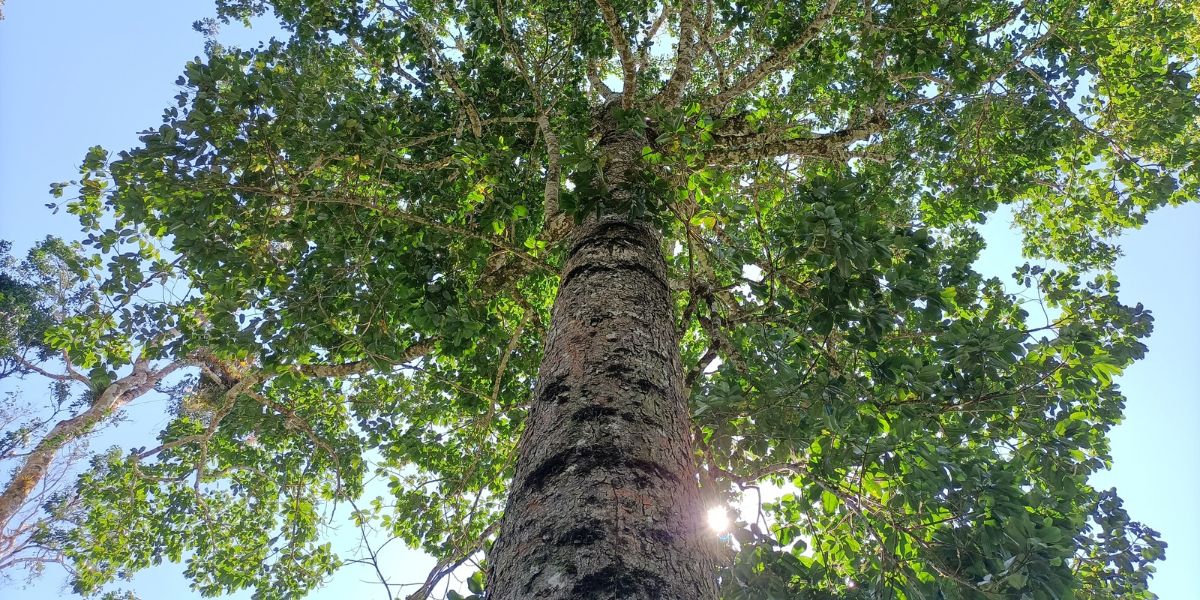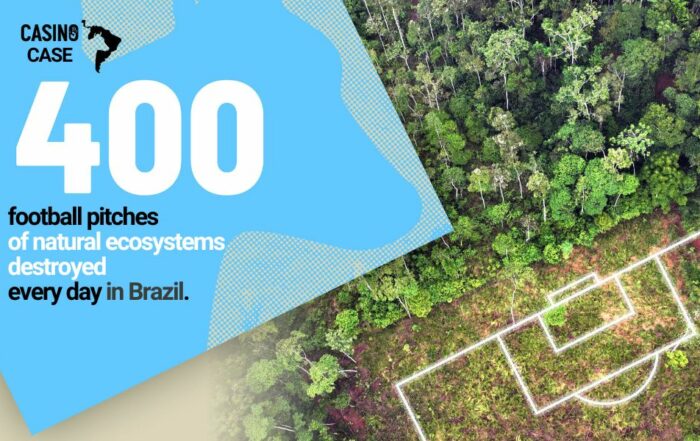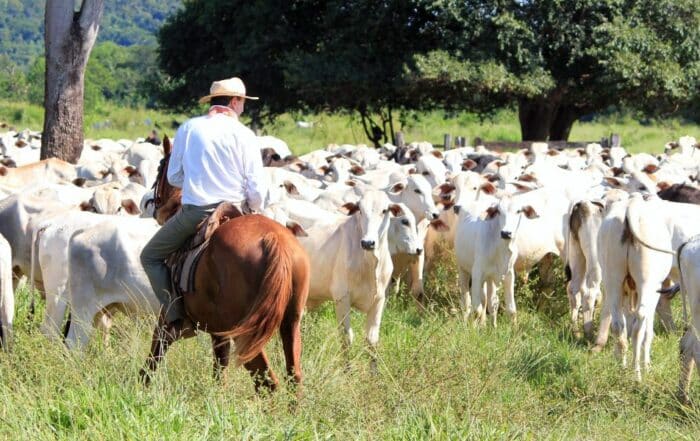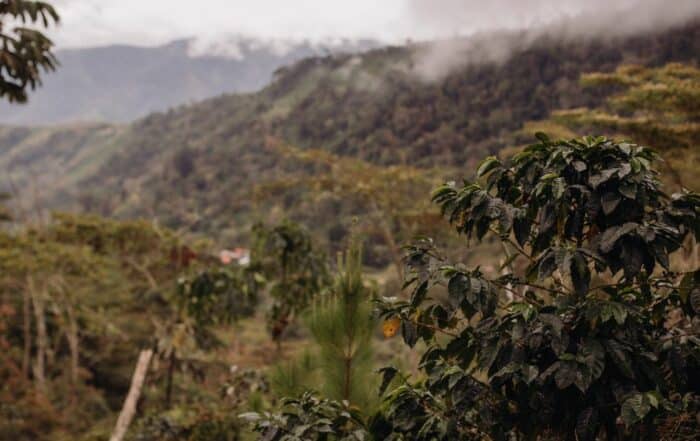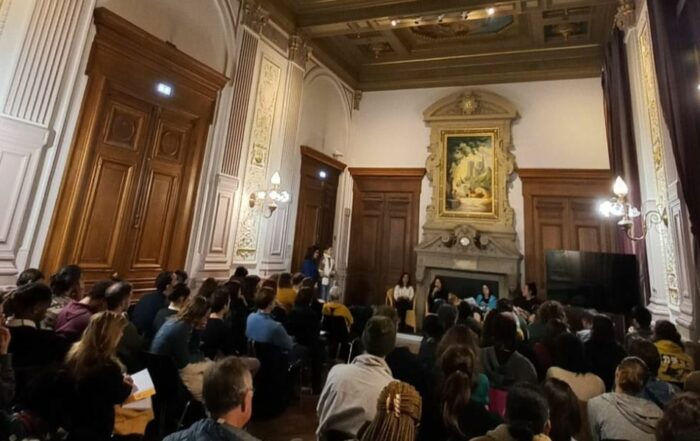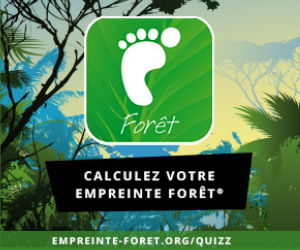Diagnosis of seed trees on the parcel owned by Ms Edith, a member of the Pampa Azángaro group © Envol Vert
In Pichanaki, the groups of participants we’ve been supporting for several years are developing economic alternatives to deforestation. In addition to cultivating Andean walnut ( Juglans neotropica), the farmers are setting up a seed network for local forest species. This network is based on the exchange and sale of seeds from native Amazonian trees in Peru. The income generated helps to support people involved in the preservation of these trees. It is a concrete way of protecting species threatened with extinction, such as mahogany (Swietenia macrophylla), and promoting reforestation with local species.
Thanks to the training sessions organized over the past two years, farmers are now able to identify seed trees and determine the optimal time for seed collection. To reinforce their knowledge and ensure the proper functioning of the Seed Network, groups of farmers were trained in April in the phenological monitoring of seed trees. This is the study of the life cycle of trees. This method involves observing and recording the development of these trees throughout the year. The aim is to improve their knowledge of the trees and enable them to collect seeds at the most appropriate time.
In the longer term, it should also help them monitor the health of the trees and observe the effects of climate change.
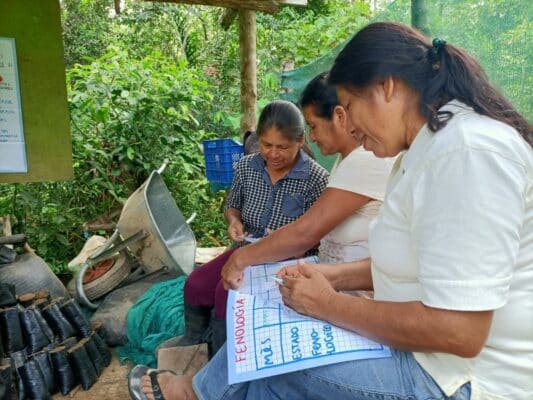
Participants from the Villa Sol group practice
using a phenological monitoring table © Envol Vert
At the same time, farmers have improved their skills in collecting, treating and preserving seeds. The aim is to obtain seeds of the highest possible quality, both viable and robust.
This knowledge is becoming particularly valuable now that participants have started to sell their seeds to other farmers and cooperatives. This increases their motivation and commitment to developing this economic alternative. Their growing involvement is also reflected in their increasingly structured internal organization and their rising autonomy.
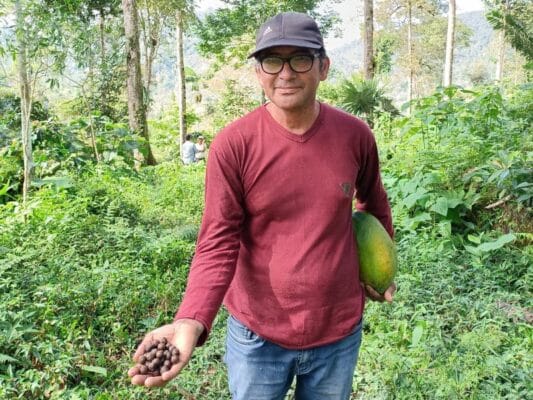
Edgar collecting Banderilla deeds (Otoba parvifolia)
in Pampa Azángaro village © Envol Vert
The Seed Network is also generating interest among students committed to biodiversity preservation. This is the case of Vania Carrera, a forestry engineering student at La Molina National Agrarian University (UNALM). Vania has chosen to dedicate her thesis to the qualitative analysis of seeds from seed trees of Andean Walnut ( Juglans neotropica) and Bayo Cedar (Cedrela angustifolia), selected within agroforestry systems in the districts of San Luis de Shuaro and Perené, province of Chanchamayo, in the Junín region.
This research aims to fill gaps in knowledge concerning the seed quality of these two species, by establishing links between seed quality, the physical characteristics of seed trees and soil properties. The objective is to promote the commercialization of these seeds on the national market. This research provides real added value to the seeds produced by farmers, who show a great interest and curiosity in the explanations and protocols presented by the future forestry engineer.
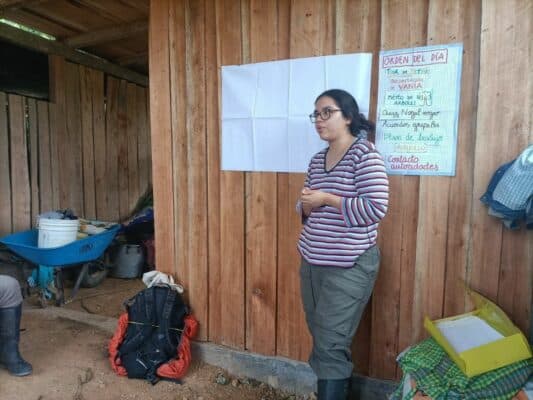
Vania Carrera, a forestry engineering student at the Universidad Nacional Agraria La Molina,
presenting her project to participants. © Envol Vert
Diagnosis of seed trees on the parcel owned by Ms Edith, a member of the Pampa Azángaro group © Envol Vert
In Pichanaki, the groups of participants we’ve been supporting for several years are developing economic alternatives to deforestation. In addition to cultivating Andean walnut ( Juglans neotropica), the farmers are setting up a seed network for local forest species. This network is based on the exchange and sale of seeds from native Amazonian trees in Peru. The income generated helps to support people involved in the preservation of these trees. It is a concrete way of protecting species threatened with extinction, such as mahogany (Swietenia macrophylla), and promoting reforestation with local species.
Thanks to the training sessions organized over the past two years, farmers are now able to identify seed trees and determine the optimal time for seed collection. To reinforce their knowledge and ensure the proper functioning of the Seed Network, groups of farmers were trained in April in the phenological monitoring of seed trees. This is the study of the life cycle of trees. This method involves observing and recording the development of these trees throughout the year. The aim is to improve their knowledge of the trees and enable them to collect seeds at the most appropriate time.
In the longer term, it should also help them monitor the health of the trees and observe the effects of climate change.

Participants from the Villa Sol group practice
using a phenological monitoring table © Envol Vert
At the same time, farmers have improved their skills in collecting, treating and preserving seeds. The aim is to obtain seeds of the highest possible quality, both viable and robust.
This knowledge is becoming particularly valuable now that participants have started to sell their seeds to other farmers and cooperatives. This increases their motivation and commitment to developing this economic alternative. Their growing involvement is also reflected in their increasingly structured internal organization and their rising autonomy.

Edgar collecting Banderilla deeds (Otoba parvifolia)
in Pampa Azángaro village © Envol Vert
The Seed Network is also generating interest among students committed to biodiversity preservation. This is the case of Vania Carrera, a forestry engineering student at La Molina National Agrarian University (UNALM). Vania has chosen to dedicate her thesis to the qualitative analysis of seeds from seed trees of Andean Walnut ( Juglans neotropica) and Bayo Cedar (Cedrela angustifolia), selected within agroforestry systems in the districts of San Luis de Shuaro and Perené, province of Chanchamayo, in the Junín region.
This research aims to fill gaps in knowledge concerning the seed quality of these two species, by establishing links between seed quality, the physical characteristics of seed trees and soil properties. The objective is to promote the commercialization of these seeds on the national market. This research provides real added value to the seeds produced by farmers, who show a great interest and curiosity in the explanations and protocols presented by the future forestry engineer.

Vania Carrera, a forestry engineering student at the Universidad Nacional Agraria La Molina,
presenting her project to participants. © Envol Vert

